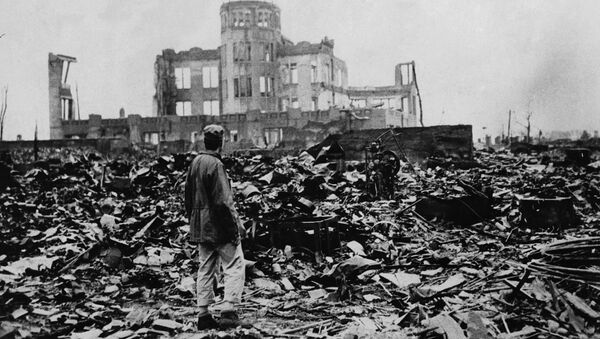The number of people, who have personally experienced the atrocious bombing and suffered the consequences is becoming less and less. Hence, their live testimonies of the events are highly valuable. Memories of ‘hibakusha’ are frightening, maybe even more so than the pictures of the nuclear mushroom.
One such memory was shared by the vice-chairman of the Japan Confederation of hibakusha ‘Hidankyo’ Sueichi Kido. The vice-chairman spoke with Sputnik, sharing his experiences and memories.
“I woke up from my mother calling me. My face was burnt. My mother had burns on her face and chest. A few days later we left for the village. Passing through the city, I saw that it was all in ruins, the streets were full of dead and mutilated people.”
“I consider myself thrice a ‘Hibakusha’. For the first time it was on August 9, 1945. The second time was in 1952, when the American occupation of Japan came to an end.
The classified information, the evidence and photographs of the atomic bombing of Japanese cities began to emerge. We learned about the radiation, and that is when I realized that I am the Hibakusha. From then on my life was full of anxieties, fears and despair. The third time I had to feel a Hibakusha, when in 1991 I moved to Gifu Prefecture, where there was no organization of Hibakusha, and I started to create it. It was like I had to relive those days, I had a lot to learn in order to protect the rights of the people affected by the atomic bombings.”
“This year marks the 70th anniversary of the atomic bombings of Hiroshima and Nagasaki. Most of those who experienced them are approaching their 80-year milestone.
And they swore their whole life to fight against nuclear weapons. All those 70 years, they have called their countrymen and people of the world to their cause. Now they want to pass the baton to the youth.”
Regarding the recent efforts of the confederation Kido said, “Our organization was created in 1956, that is 11 years after the bombing. We believe that this time is irretrievably lost. US occupation administration forbade disclosure of any information about the bombing and their consequences. General MacArthur rejected the offer of even the International Red Cross to provide food and medicines to the victims. For as many as 11 years the Hibakusha were deprived of information, treatment and care, not to mention the prevention of radiation hazards. Not knowing this, people went back to the same location, built homes, grew vegetables and tried to revive the former life. Is it not a crime against humanity?”
“In August 1956, in Nagasaki the organization Hidankyo was established. Its objectives are not only to provide possible assistance to the victims of the atomic bombings, but also fight for the abolition of nuclear weapons. To put it briefly, our appeal to the international community is to prevent the new and more hibakusha. As long as there is a danger of nuclear war and while the world has at least one nuclear weapon, the hibakusha will continue to cry out, “Do not let nuclear war to break out! Eliminate nuclear weapons as they can end our civilization!”
Regarding the US and its attack on Japan, Sueichi Kido said “Yes, we demand an apology from the United States. We demand them to recognize that dropping atomic bombs on Hiroshima and Nagasaki was contrary to the principles of humanity and international law. We want them to apologize and eliminate nuclear weapons by destroying their own nuclear weapons first. We understand that this does not happen all at once, but if the United States led the movement for the complete prohibition of nuclear weapons, it would show the Japanese people that they are repentant.”




